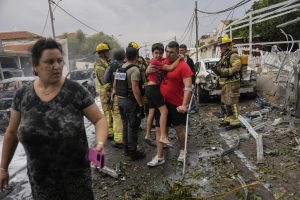Along with much of the rest of the world, Southeast Asian governments in recent days issued official responses to the escalating conflict between Israel and the Palestinian militant group Hamas, following the latter’s gruesome attacks on civilian settlements adjacent to the Gaza Strip in southern Israel.
Reactions in the region have been divided, reflecting Southeast Asia’s geographic distance from the conflict, its nations’ varying degrees of relations with Israel, and the proximity of the Israel-Palestine conflict to the politics of the region’s Muslim-majority nations.
Perhaps the most forthright condemnation was issued by Singapore, which has enjoyed a close relationship with Israel dating back to its independence in 1965. In a statement, a spokesperson for the Ministry of Foreign Affairs said that the city-state “strongly condemns the rocket and terror attacks from Gaza on Israel, which have resulted in deaths and injuries of many innocent civilians.” “Our thoughts are with the families of the victims,” it added. “We call for an immediate end to the violence and urge all sides to do their utmost to protect the safety and security of civilians.”
The Philippines also issued a relatively robust statement, perhaps unsurprisingly given its proximity to the United States, one of Israel’s closest international partners. In a statement, the Office of President Ferdinand Marcos Jr. expressed its condolences to those who have lost loved ones in the Hamas attacks.
While it did not name the Palestinian group directly, the statement said that the Philippines “condemns the attacks, especially against civilian populations,” according to the Philippine News Agency. It added that “the Philippines understands the right of states to self-defense in the light of external aggression as recognized in the United Nations Charter.” Separately, Marcos ordered the government to closely coordinate with the Philippine embassy in Tel Aviv and the Migrant Workers Office in Israel to help Filipinos affected by the ongoing conflict. Some 30,000 Filipino workers are present in Israel, but most of them are far from the southern region near the Gaza Strip.
Most other nations took a more muted approach, reflecting their perceptions of the seriousness of the conflict – but also its remoteness from Southeast Asian concerns. Jakkapong Sangmanee, Thailand’s deputy foreign affairs minister, offered his country’s “deepest condolences to the Government and people of Israel on the unfortunate loss of lives and injuries from this inhumane and indiscriminate act.” Despite referring explicitly to “the deadly Hamas-led attack against Israel,” Jakkapong said that Bangkok’s position was “one of neutrality.” It added that Thailand “promotes a solution that would allow Palestine and Israel to coexist.”
The Thai government’s main goal is to secure the release of the 11 Thai nationals who have also reportedly been taken hostage by Hamas, in addition to the 12 that were reportedly killed in the assaults on southern Israel. As of August, more than 4,533 Thais were working in Israel, where many are employed as farmhands.
Vietnam’s government took a similar approach of calling for calm and restraint, while refusing to weigh in strongly on one side or the other. Ministry of Foreign Affairs spokesperson Pham Thu Hang said in a statement on Sunday that Hanoi was “profoundly concerned” over the escalating violence between Hamas and Israel. “We call on relevant parties to exercise restraint, refrain from taking actions that complicate the situation, and soon resume negotiations to resolve disagreements through peaceful means,” she added. Meanwhile, the Cambodian Foreign Ministry issued a statement expressing its “deep regret” for the conflict and “condemns all forms of violence and terrorist acts.” It also called for “all parties to exercise utmost restraint and seek avenues for de-escalation and ceasefire.”
The nations that came closest to expressing a firm opinion on the Gaza conflict, and the nature of the Israel-Palestine conflict more generally, were Southeast Asia’s two largest Muslim-majority nations, where public support for the Palestinian cause is widespread. Indeed, Indonesia built a hospital in the Gaza Strip in 2011 from money donated by Indonesians, and one Palestinian staff member was reportedly killed in an Israeli counterstrike on Saturday.
These nations avoided directly referring to the attacks on civilians as “terrorism” or naming Hamas as the perpetrator, instead nesting them within the context of Israeli occupation.
“Indonesia is deeply concerned with the escalation of conflict between Palestine and Israel. Indonesia urges the immediate end of violence to avoid further human casualties,” Indonesia’s Foreign Ministry said in a statement published on X (formerly Twitter). In a separate tweet, it added, “The root of the conflict, namely the occupation of the Palestinian territories by Israel, must be resolved, in accordance with the parameters agreed upon by the U.N.”
Similarly, Malaysia’s government said that it was “deeply concerned over the loss of so many lives due to the latest escalation of clashes in and around the Gaza Strip,” and called on all parties “to exercise utmost restraint and de-escalate.”
It then went on to accuse the world of “flagrant hypocrisy in dealing with any regime [Israel] that practices apartheid and blatantly violates human rights and international law.”
“The root cause must be acknowledged,” it stated. “The Palestinians have been subjected to the prolonged illegal occupation, blockade and sufferings, the desecration of Al-Aqsa, as well as the politics of dispossession at the hands of Israel as the occupier.”

































